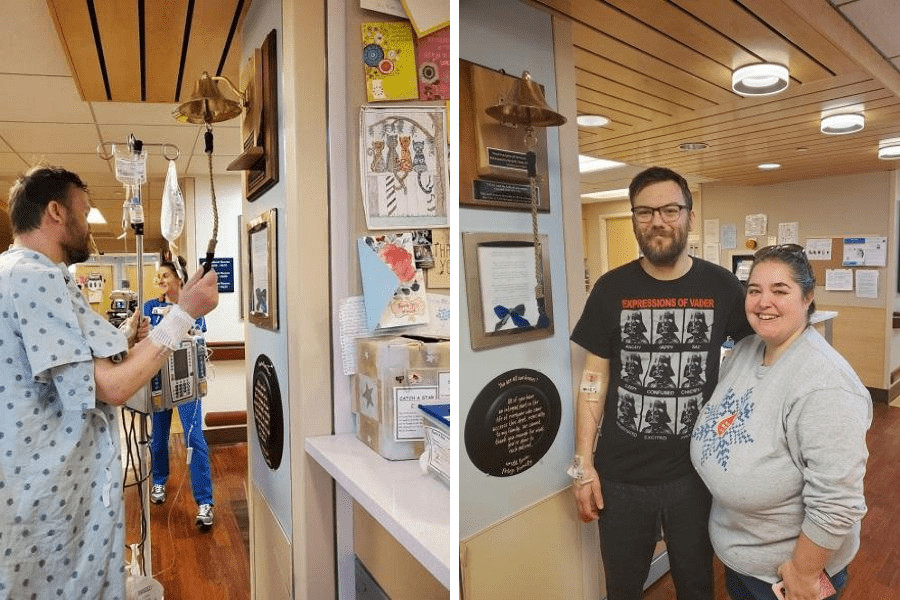Can a pancreas transplant cure type 1 diabetes? Can it make a difference for patients with type 2 diabetes, too? We’ll answer these questions and others about pancreas transplants and diabetes in this blog post.

Can a Pancreas Transplant Cure Type 1 Diabetes?
Yes: a pancreas transplant can cure type 1 diabetes. In fact, a pancreas transplant is the only cure for diabetes, explains transplant medicine physician Dr. Tambi Jarmi of Mayo Clinic.
As diabetes.co.uk explains, the pancreas produces insulin, which is a hormone that assists with the healthy regulation of blood glucose (or blood sugar) levels in the body. Insulin helps to regulate blood sugar by helping the body move glucose from the blood into the cells.
When a patient is living with type 1 diabetes, the body’s immune system targets its own cells, making it more difficult for the pancreas to produce sufficient insulin and regulate blood sugar in a healthy way.
When a patient living with type 1 diabetes receives a pancreas transplant, the new pancreas is more capable of producing insulin, which means the body no longer experiences the insulin production and transportation issues that cause patients to live with symptoms of type 1 diabetes.
While some medical professionals consider type 1 diabetes to be a life-long or chronic diagnosis, most patients who receive a successful pancreas transplant for type 1 diabetes no longer experience the symptoms of the diagnosis, which can range from excessive hunger and thirst and fatigue to vision loss to organ damage and kidney failure according to the Cleveland Clinic. Many patients no longer self-identify as type 1 diabetics post-transplant.
Real-Life Example: A Pancreas Transplant Cured My Type 1 Diabetes

John Wilson, a Help Hope Live client fundraising for transplant-related medical costs, received a pancreas and kidney transplant in February 2020. John was diagnosed with type 1 diabetes in 1998. Pre-transplant, John experienced severe vision loss and life-threatening kidney failure.
“I am now cured from type 1 diabetes thanks to my new pancreas,” explained John. “The new kidney is functioning well, too. I am healthy now and recovering well.”

Are Pancreas Transplants an Option for All Type 1 Diabetics?
While living without diabetes following a transplant is a life-changing reality for some patients, a pancreas transplant isn’t always an option for patients living with type 1 diabetes. Patients who are experiencing consistently poor blood sugar control, organ failure such as end-stage kidney disease, or frequent negative reactions to insulin may be among the top candidates for a pancreas transplant.
Here are a few reasons why someone may not be a fit for a pancreas transplant for type 1 diabetes:
Wait times. While some organs can come from a living donor, potentially shortening a wait time, a pancreas transplant can only come from a deceased donor. Patients who are listed for a pancreas transplant for type 1 diabetes may face an average wait of one to two years, or longer, depending on their location and their position on the waiting list. Depending on the patient’s medical condition, one to two years or longer may be too long to wait for such a medical intervention. Patients may also wait longer for a multiple organ transplant.
Multi-organ transplant risks. While life-saving, a multi-organ transplant like the kidney-pancreas transplant that John received may have greater risks than a single-organ transplant. Medical professionals must weigh whether a patient is healthy enough to undergo such the procedure if they require an additional organ transplant in addition to a pancreas transplant.
Associated cost. As our client John Wilson explained, it is challenging for an insurance company to approve cost assistance for a pancreas transplant for type 1 diabetes if it is not deemed a “life-saving measure”: in other words, if the patient living with type 1 diabetes may be able to manage their condition to a reasonable degree to stay alive. Out-of-pocket, a pancreas transplant can exceed $408,000.
A multiple organ transplant necessitated by some of the side effects of diabetes, such as John’s pancreas-kidney transplant following kidney failure, may be more likely to be considered life-saving and therefore eligible for financial help from insurance.
Risks and complications. A pancreas transplant for type 1 diabetes comes along with potential complications that may prompt medical professionals to weigh the risk versus the reward of a transplant for a particular patient. Risks can include blood clotting and bleeding, infections, metabolic issues, and urinary complications according to Mayo Clinic.
Potential for rejection. Organ rejection is a major concern for all transplant recipients. If a patient’s body rejects a transplanted organ, the organ will no longer fulfil its role in combatting the symptoms of the associated diagnosis. In other words, if a type 1 diabetes patient receives a pancreas transplant and their body rejects the pancreas, they will continue to live with the symptoms of type 1 diabetes unless they are healthy enough to rejoin the waiting list for a pancreas.
Transplant rejection can be both a physical and a mental and emotional setback for patients. Transplant teams examine a patient’s holistic readiness for a transplant, including factors like emotional support as well as physical health, before they approve a patient to join the waiting list for an organ.
Anti-rejection medication side effects. Patients who receive a transplant must take anti-rejection medications (also called immunosuppressants) for the organ’s lifetime. These medications come with potential side effects of their own that can damage a transplant recipient’s health, including osteoporosis and high cholesterol or blood pressure, as Mayo Clinic explains.
Can Type 2 Diabetes Patients Get a Pancreas Transplant?
As Mayo Clinic explains, a pancreas transplant typically will not treat or cure type 2 diabetes. In type 1 diabetes, the pancreas is not producing insulin sufficiently, so a new pancreas may support healthier insulin production. However, in type 2 diabetes, the body resists insulin or does not use insulin efficiently. A new pancreas will increase insulin production, but it cannot prevent insulin resistance or inefficient use in patients, so it will not cure type 2 diabetes.
If a patient with type 2 diabetes has low insulin production levels as well as insulin resistance issues, a pancreas transplant may still be an option.
Getting Help with Pancreas Transplant Expenses

If you are a type 1 or type 2 diabetic who is joining the waiting list for a pancreas transplant, you may need help to cover the associated out-of-pocket expenses. Our nonprofit can assist: we provide secure, trusted, and experienced medical fundraising help for transplant patients like you.
Learn how we’re different from crowdfunding or submit a short campaign request now to get help:
If fundraising is not a fit for you, access a guide to additional transplant resources here:
Written by Emily Progin








